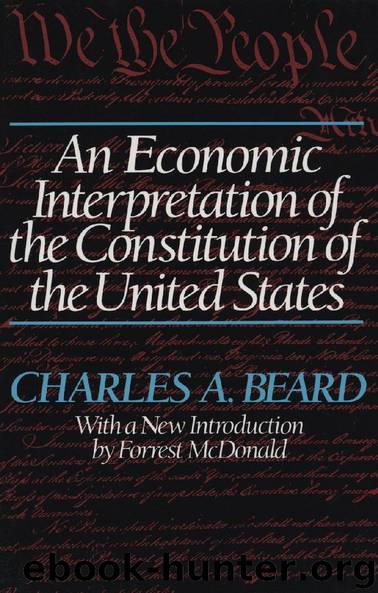An Economic Interpretation of the Constitution of the United States by Charles A. Beard

Author:Charles A. Beard
Language: eng
Format: epub
Publisher: Free Press
CHAPTER VII
THE POLITICAL DOCTRINES OF THE MEMBERS OF THE CONVENTION
HAVING examined the economic implications of the Constitution in the light of the greatest of all commentaries, The Federalist, it is now interesting to inquire whether the members of the Convention at large entertained substantially identical views as to the political science of the system. There are several difficulties in the way of such an investigation. Not all of the delegates, indeed not all of the most influential, were speech makers or writers or philosophers. As intensely practical men they were concerned with tangible results, not with the manner in which political scientists might view the details of their operations. There is, accordingly, a considerable danger of attempting too much in making generalizations, and to obviate this as far as possible, the method of taking the members in alphabetical order is adopted, and the evidence of the views entertained by each is fully documented. 1*
The leaders in politics and political philosophy in the eighteenth century were not far removed from that frank recognition of class rights which characterized English society, and they were not under the necessity of obscuring — at least to the same extent as modern partisan writers — the essential economic antagonisms featuring in law and constitution making. Their clarity of thought was greatly facilitated by the disfranchisement of the propertyless, which made it unnecessary for political writers to address themselves to the proletariat and to explain dominant group interests in such a manner as to make them appear in the garb of “public policy.”
There does not appear, of course, in the writings of American political scientists in the eighteenth century, that sharp recognition of class rights which characterizes the feudal legists, because within the propertied interests politically represented in the government, there were divisions which had to be glossed over; and there were also mutterings of unrest on the part of the disfranchised which later broke out in the storm that swept away the property qualifications on voters and introduced political equalitarianism. Under these circumstances the supporters of the Constitution had to be somewhat circumspect in the expression of their views; but, happily for science, the proceedings at Philadelphia during the drafting of the Constitution were secret, and they were able to discuss with utmost frankness the actual politico-economic results which they desired to reach. Fortunately, also, fragmentary reports of these proceedings have come down to us, and have been put in a definitive form by Professor Farrand.
Abraham Baldwin, of Georgia, did not indulge in any lengthy disquisitions on government in the Convention, and his literary remains are apparently very meagre. However, his view that the Senate of the United States ought to represent property came out in the debate on June 29, over a motion by Ellsworth to the effect that the “rule of suffrage in the second branch be the same as that established by the Articles of Confederation.” Baldwin immediately opposed the proposition, saying, “He thought the second branch ought to be the representation
Download
This site does not store any files on its server. We only index and link to content provided by other sites. Please contact the content providers to delete copyright contents if any and email us, we'll remove relevant links or contents immediately.
The Secret History by Donna Tartt(19083)
The Social Justice Warrior Handbook by Lisa De Pasquale(12190)
Thirteen Reasons Why by Jay Asher(8907)
This Is How You Lose Her by Junot Diaz(6885)
Weapons of Math Destruction by Cathy O'Neil(6279)
Zero to One by Peter Thiel(5798)
Beartown by Fredrik Backman(5751)
The Myth of the Strong Leader by Archie Brown(5507)
The Fire Next Time by James Baldwin(5441)
How Democracies Die by Steven Levitsky & Daniel Ziblatt(5218)
Promise Me, Dad by Joe Biden(5153)
Stone's Rules by Roger Stone(5087)
A Higher Loyalty: Truth, Lies, and Leadership by James Comey(4959)
100 Deadly Skills by Clint Emerson(4924)
Rise and Kill First by Ronen Bergman(4788)
Secrecy World by Jake Bernstein(4751)
The David Icke Guide to the Global Conspiracy (and how to end it) by David Icke(4717)
The Farm by Tom Rob Smith(4506)
The Doomsday Machine by Daniel Ellsberg(4489)
